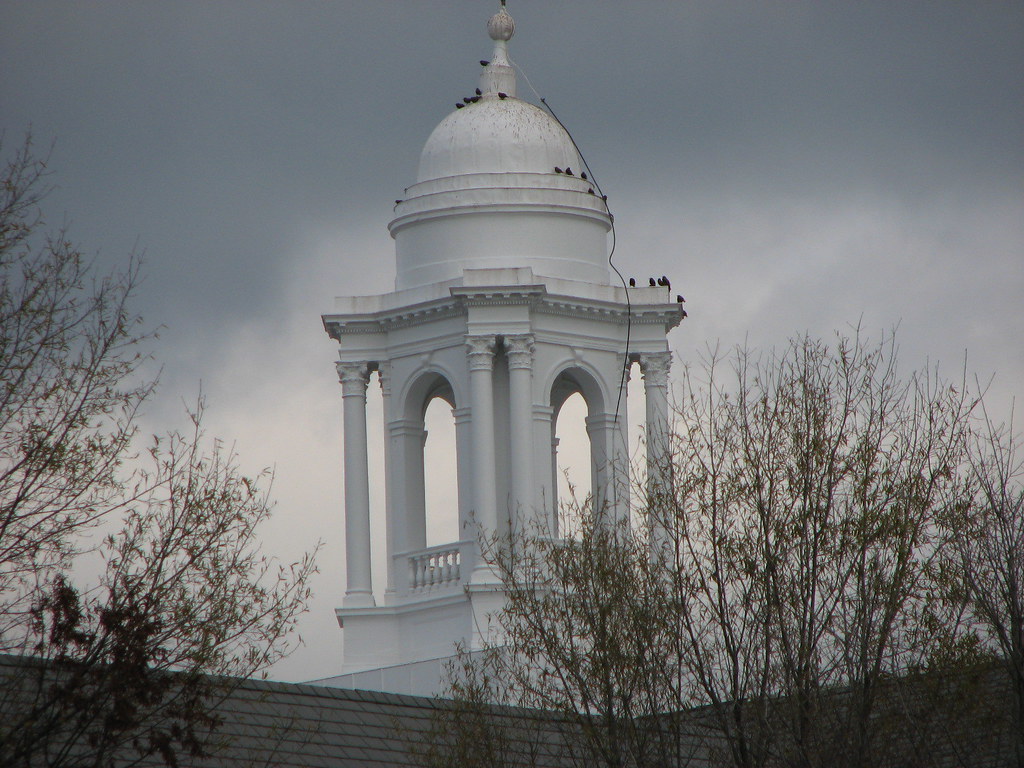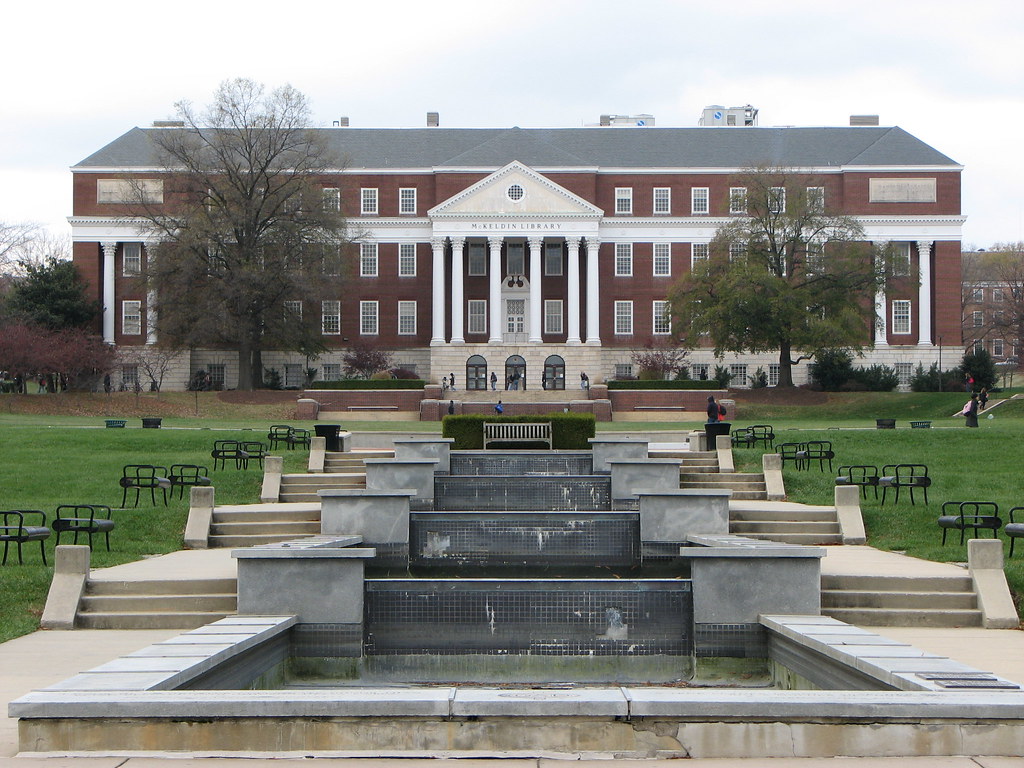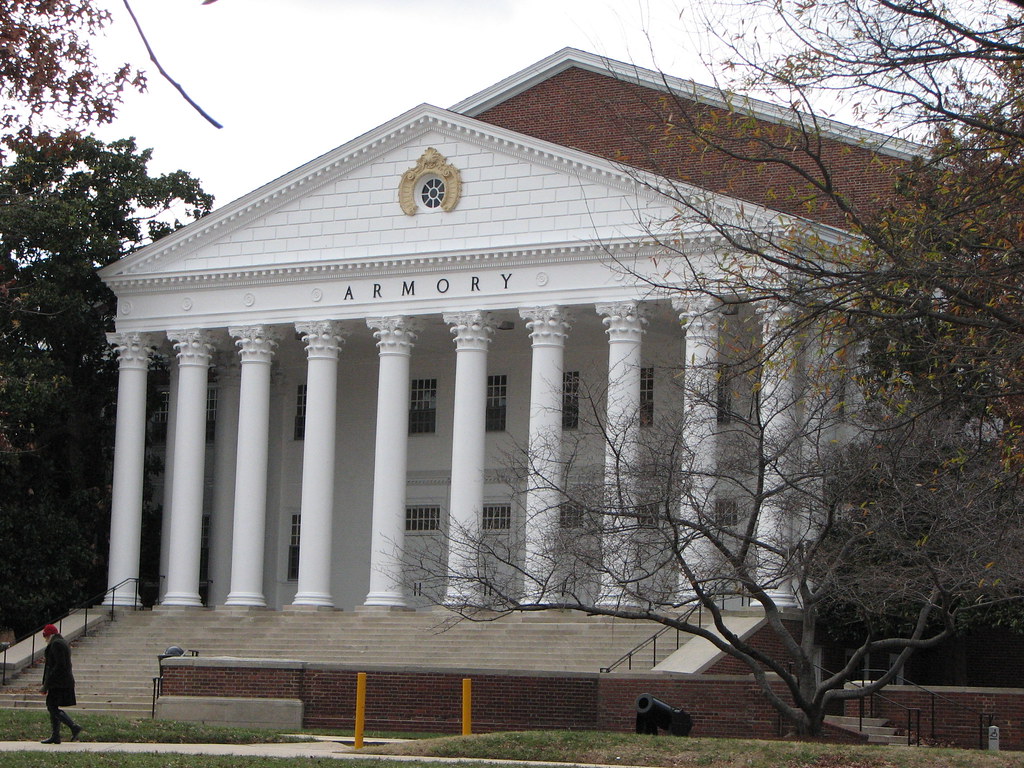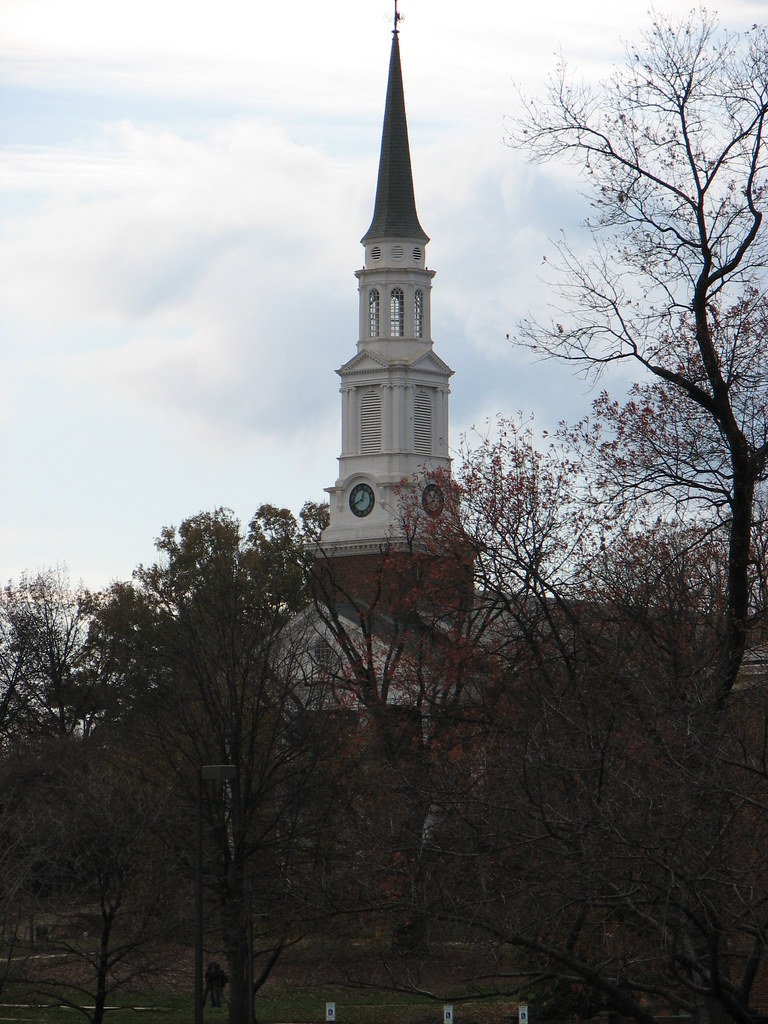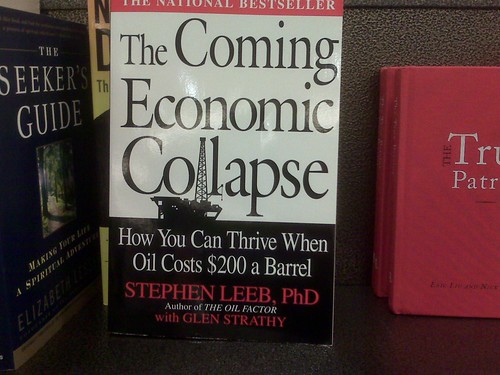Sunday, November 30, 2008
The last thing he wants to do
Attitude
If you go in for motivational posters, I'm going to climb out on a limb and say that you have never seen one better than this.
(2) Comments
Acknowledging racism is not racism
Noel Sheppard reports that a senior executive at NBC News has said that Barack Obama will, as "the leader of the biggest democracy in the world," have more "legitimacy in the street around the world" than any American leader, ever, because he is a "person of color." Sheppard thinks that it is racist of the executive, Mark Whitaker, to say this:
Imagine that. Because Obama is black, before he even steps into the White House and accomplishes one darned thing he already has more legitimacy around the world than possibly every American president that came before him.
Isn't that racist? Isn't suggesting that someone is better or more "legitimate" solely because of the color of his or her skin a tremendously offensive concept?
Sheppard is, I think, unfair to Whitaker. The quoted passage might as easily be an assessment of what is -- that most of the world is racist and will therefore ascribe greater legitimacy to Barack Obama because of his race -- as what ought. Nothing in the quoted passage suggests that it is good that the world is this way. Acknowledging racism is not racism.
Of course, Sheppard might well have criticized Whitaker for a subtly different point, which is his implication that the United States might in this case benefit from the racism of the world. Most of the time, the politically correct view is that the benefits of racism are themselves contaminated, fruits of the poisonous tree.
There are exceptions. There are innocent beneficiaries of racism whom we do not begrudge. Usually these are people who have already been the victim of racism, or are descended from people who have been. Certain forms of affirmative action are, in fact, "positive racism," and while many people may object to the policy, few believe that its beneficiaries commit a moral offense by accepting its benefits.
There is another exception, and that is that it is always acceptable to use racism against the racist. If Barack Obama is more effective at advancing American interests at the expense of our enemies -- all of whom are more racist by virtually any measure than the contemporary United States -- because he is popular with the downtrodden masses of the world, then we should delight in that advantage and exploit it to the utmost.
Of course, Whitaker did commit another gaffe, and a quite astonishing one at that given the dominant news story this week: The United States is not "the biggest democracy in the world." This is NBC's Washington Bureau Chief, the man in charge of the "Nightly News," the "Today" show, MSNBC, and "Meet the Press"? That explains a great deal.
CWCID: Glenn Reynolds.
(10) Comments
The Mumbai attack and the British connection
There are reports that the Mumbai jihadis were funded by cash raised in mosques in the United Kingdom. If true, then it would seem to be yet another strategic shift in the war between Islamist jihadis and, well, everybody else. The war began with attacks on Western interests in the Muslim world (Mogadishu, Khobar, the African embassies, the USS Cole, and Bali) launched and financed from the Muslim world. Then it spread, in the networked way that ideological insurgencies metastesize, to attacks against Western homelands, at first planned and financed from Afghanistan (New York, and Washington), and then within the West (Madrid and London). Now, in Mumbai, there is an attack in the center of Asia financed from London. Wherever there are radical Muslims preaching hatred, there are jihadis raising money and planning attacks.
Is there any doubt that it is a global war?
(3) Comments
The best $7.2 million ever spent
That whole Alaska deal just keeps getting better and better. I bet the Russians are still pissed off about it.
(3) Comments
Democracy in Iraq: Talking tough on oil
Drudge and others are irritated that Iraq's oil minister said that $80 per barrel is a "reasonable price" for oil. The general idea seems to be that this reflects a lack of gratitude.
Frankly, I think that is looking at it the wrong way.
The thing is, we went and created a democracy over there. The government actually cares about its own popularity because it needs to keep winning elections. That means that it needs to spend money on things that the voters want. Well, in establishing its 2009 budget the government of Iraq assumed that the price of oil would be -- you guessed it -- $80/barrel. Elected Iraqi politicians now have to explain to voters why government spending has to be lower than originally forecast. Obviously, they cannot say that any price below $80 is "reasonable" without losing support to rival politicians. Gratitude -- if that is what any of them actual feel toward the United States -- will not help them win the next election.
Iraq may yet turn out to be an ally of the United States when it really matters, but sure as Allah made little green apples its politicians will always want the price of oil to be higher, at least as long as they have to win contested elections. If you doubt this, look up the last time a national politician told Iowans that corn and soybean prices really ought to be lower so that foreigners can eat more inexpensively.
Yes, we have gone and created a democracy in Iraq. History may yet record that it will change the Arab Muslim world, and quite possibly for the better. But do not expect Iraqi voters, who are no different than voters anywhere else, to support low oil prices. They will vote for tough talk on oil every time. That is, indeed, the obvious ultimate reason why the war to liberate Iraq from the Ba'athists and transform its system of government was never about lowering the price of oil for Americans.
(17) Comments
Saturday, November 29, 2008
"Black Friday" sales were stronger than expected
"Black Friday" sales were stronger than expected; preliminary estimates suggest that they are actually up 3% over last year. What with all the discounts, it is not obvious how profitable those sales will be, but sales are sales and they reveal that many Americans are still willing to trade dollars for stuff.

In his column this morning, Floyd Norris noted that lower percentages of Americans say they expect to buy a house or a car in the next six months than at any time since 1982 (in the case of houses) or in the entire 40 year history of the survey (in the case of cars). How to reconcile this with surprisingly not-terrible Black Friday sales? Well, if you decide you can get along with your old car for another couple of years -- most new automobile purchases are, after all, essentially luxuries, insofar as you can almost always make your old one last longer -- and that you will not be furnishing a new house any time soon, you might then decide that you can afford to buy some reasonably nice Christmas presents for your family. The economy may indeed be shrinking, but that does not mean that all businesses are shrinking.
[Corrected.]
(4) Comments
Biden time
Lest there be any doubt that Joe Biden has fallen into a public relations black hole, scroll through the 'Vice President-elect Joseph Biden' slideshow on the Yahoo news photo feed. This is all the wire services of the world have been able to scrounge together since the election (and a lot of these photographs are from the campaign)? There's a chance I've been photographed more than that in the last four weeks, and Sarah Palin absolutely has.
(0) Comments
Legend fabrication watch: The small donor myth bites the dust
History will record that Barack Obama destroyed campaign finance regulation in this country. He exploited John McCain's fidelity to the law that bears his name by rejecting the public system for financing presidential campaigns knowing that McCain could not bring himself to follow suit. Basically, Obama hoisted just about the only nationally important Republican politican who supports campaign finance regulation on his own petard, thereby making it impossible for other Republicans to accept public money and permissible for Democrats to decline it. As a regulatory device, public campaign finance is dead and Barack Obama killed it.
Obama threw up a number of justifications for this decision, but his most widely-quoted defense was that his reliance on "small donors" displaced at least one of the reasons for regulating campaign donations: That the rich dudes would steal the election. Robert Gibbs, the Obama campaign's communication director, actually took a victory lap when his boss announced the decision to rejected public funds back in June:
But, bottom line, the Obama camp believes that its reliance on small donors for its historic fundraising success is itself reforming the financing of campaigns. More than 90 percent of Obama's donors, Gibbs says, gave $100 or less, and the campaign doesn't accept money from lobbyists. "Campaign finance reform," Gibbs says, "is taking place in our campaign."
Well, it turns out that Gibbs fibbed:
Everybody knows how President-elect Barack Obama's amazing campaign money machine was dominated by several million regular folks sending in hard-earned amounts under $200, a real sign of his broadbased grassroots support.
Except, it turns out, that's not really true.
In fact, Obama's base of small donors was almost exactly the same percent as George W. Bush's in 2004 -- Obama had 26% and the great Republican satan 25%. Obviously, this is unacceptable to current popular thinking.
But the nonpartisan Campaign Finance Institute just issued a detailed study of Obama's donor base and its giving. And that's what the Institute found, to its own surprise.
"The myth is that money from small donors dominated Barack Obama's finances," said CFI's executive director Michael Malbin, admitting that his organization also was fooled. "The reality of Obama's fundraising was impressive, but the reality does not match the myth."
Adding up the total contributions from the same small individuals (in terms of dollar amounts, not their height), the Institute discovered that rather than the 50+% commonly....
...reported throughout the campaign, only 26% of Obama's contributions through last August and only 24% through Oct. 15 came from people whose total donations added up to less than $200.
The key word there being "total."
It should not surprise us, I suppose, that a presidential campaign's communications directors should just up and lie. The amazing thing is that he was able to do so without being called to the carpet by the press, which had the truth at its fingertips in a searchable database, if only it were interested.
Now, I am no big fan of public-financing for election campaigns, so I appreciate all that Barack Obama has done to discredit it. Let us not hear again, though, from the editorial board of the New York Times or any of the other press barons who purport to want to get the money out of politics. They had their chance to dig deeply into the substance and process of the Obama campaign's fundraising when it might have had an impact and declined to do so for reasons that are all too obvious.
We will remember.
CWCID: Glenn Reynolds.
(8) Comments
Antebellum chimney
When I was a boy, a cabin that pre-dated the Civil War sat on this site in rural Virginia. It eventually collapsed and the pieces were taken away, but the chimney remains.
(1) Comments
Balance of Ridicule
You might think that an organization that for most of the first of its not yet two centuries of existence was the world’s most notorious proponent of startlingly unconventional forms of wedded bliss would be a little reticent about issuing orders to the rest of humanity specifying exactly who should be legally entitled to marry whom. But no. The Mormon Church—as anyone can attest who has ever answered the doorbell to find a pair of polite, persistent, adolescent “elders” standing on the stoop, tracts in hand—does not count reticence among the cardinal virtues. Nor does its own history of matrimonial excess bring a blush to its cheek.Not likely to appear in the pages of the New Yorker.
UPDATE: A commenter points out that some portion of New Yorker editors actually believe polygamy is officially endorsed by the Mormon Church. Tsk, tsk, how provincial and ignorant!
SECOND UPDATE: Have we invaded Iran yet?
(3) Comments
Glaciers are growing again
Since you will not see this news in your newspaper, on network television, or inside Newsweek, I make it available as a public service: Glaciers in Norway and Alaska are growing again, in some cases for the first time in 250 years. Make of it what you will.
(4) Comments
An ode to self-reliance
Here is a useful reminder that individuals and families actually can cope with personal crises that others would regard as the perfect opportunity for government intervention.
(1) Comments
Friday, November 28, 2008
The seige is over
The last of the Mumbai terrorists have met their maker. Nobody will miss them.
Commandoes killed the militants making a last stand at the Taj Mahal hotel Saturday, Police Chief Hasan Ghafoor said, ending days of terror that left more than 150 people dead. "The Taj operation is over. The last two terrorist holed up there have been killed," Mr. Ghafoor told The Associated Press.
At least three Americans are among the dead.
If you are American and remember September 11, you know what India must be feeling right now. The world's largest democracy is in pain tonight, and we should keep her and her heroes in our prayers.
(3) Comments
Barack Obama is still winning votes
If Obama had announced his national security team and his economic team while he was running for office, then I'd have voted for him, but he'd have lost. What a curious state of affairs.
I do not recall ever seeing a president-elect tack to the center so quickly and decisively during a transition. It is indeed very reassuring while the economic situation is so uncertain.
Of course, we have not really heard from the Congress. When the new Democratic majority gets to work in January, the question will be whether it starts pushing on legislation that forces Barack Obama to choose between his old friends on the left and his new ones in the center. Looked at that way, would Barack Obama prefer that Norm Coleman and Saxby Chambliss keep their seats, or that the Democrats win and take away the filibuster excuse? I suspect that deep down, off-the-record, and entirely on the hush and hush, President Barack Obama would rather that the Democrats have 58 or 59 seats in the Senate than 60. And, in any case, he does not need Senator Al Franken on every talk show in the country during the next few years.
(8) Comments
The return of thrift and the essence of capitalism
Stephen Roach, the chairman of Morgan Stanley Asia, sees a silver lining in the collapse in personal consumption:
The good news is that lines should be short for today’s “first shopping day” of the holiday season. The bad news is more daunting: rising unemployment, weakening incomes, falling home values, a declining stock market, record household debt and a horrific credit crunch. But there is a deeper, potentially positive, meaning to all this: Consumers are now abandoning the asset-dependent spending and saving strategies they embraced during the bubbles of the past dozen years and moving back to more prudent income-based lifestyles.
This is a painful but necessary adjustment. Since the mid-1990s, vigorous growth in American consumption has consistently outstripped subpar gains in household income. This led to a steady decline in personal saving. As a share of disposable income, the personal saving rate fell from 5.7 percent in early 1995 to nearly zero from 2005 to 2007.
In the days of frothy asset markets, American consumers had no compunction about squandering their savings and spending beyond their incomes. Appreciation of assets — equity portfolios and, especially, homes — was widely thought to be more than sufficient to make up the difference. But with most asset bubbles bursting, America’s 77 million baby boomers are suddenly facing a savings-short retirement.
Commentary
The harsh reality is that the changing attitude of American consumers toward thrift is one of the major causes of the current global financial crisis. Millions of Americans borrowed more money than they could afford to repay in reliance on rising asset values. Sure, the financial services industry abetted the borrowing by lowering standards to accomodate the ever-greater ambitions of American consumers, but at the end of the day nobody can force you to borrow and spend too much. You do that yourself, to yourself. The return of thrift will force us to recognize that inconvenient truth, even if we do not often say it out loud.
Roach makes a policy argument in favor of thrift, but there is a spiritual or psychological aspect to it. There is something enormously satisfying about living well below one's means. Not only do you have choices that more fully tapped people do not have, but you know that you have it within yourself to postpone material gratification. There is power in that. You either know this or you do not. Chances are, if you are a typical American, your grandparents knew it and you do not.
Apart from its spiritual benefits, thrift permits the accumulation of capital. Capital is the foundation of your personal prosperity. When I was but a wee bearn, I proposed to my grandmother that I spend a nickel on a candy bar. She, the only economics major in her class at Vassar, observed that "a nickel is all a dollar can earn in a year." At age seven I had no idea what she was talking about, but when I finally grasped her meaning a light went off. Since then, I have not been able to spend money without automatically calculating how much capital I would need to earn what I am proposing to spend. Not how long I would need to work to earn the money I am about to spend, but how much capital I would need to produce what I am about to spend. Develop that habit and you will spend your money more carefully, I guarantee it.
All of this leads, of course, to a final obvious point: Accumulated capital is the basis not only of personal wealth, but national wealth. If you save your money and invest it productively -- not, by the way, in the house you live in or illiquid stores of wealth, such as land or specie, but actual businesses, directly or indirectly through bank deposits or the capital markets -- you are building the wealth of America and, with it, all the world.
Politicians will tell you to consume, which for most Americans means to borrow and spend. They say this because they are interested in short-term results -- illusory prosperity -- to get them past the next election. Many people will fall for this advice. You, however, do not have to join them. You can be the source of capital for permanent prosperity. You can do this because now you, too, know the essential lesson of capitalism: "A nickel is all a dollar can earn in a year."
(11) Comments
Gone west
Bill Whittle notes the passing of a great American whom none of have heard of, and we all know.
(1) Comments
Thursday, November 27, 2008
The security agreement and democracy in Iraq
The parliament of Iraq has approved the security agreement with the United States (various blog reactions here). It is the product of extended negotiations, both between the two governments and, on the Iraqi side, among the many factions on whom the government depends for support. The Iraqi government needed to campaign for the votes to ratify the agreement, and it was only able to secure its passage after having extracted concessions from the United States. The final concession was a requirement that the entire agreement be subjected to a national referendum, the effect of which would be to truncate its term by a year.
I confess that I have not studied the agreement or followed the details sufficiently to have a strong opinion about the substance of the deal. This much, though, seems clear: It is the product of a manifestly pluralistic, democratic negotiation. Is it possible even to imagine a similar process in any other Arab country?
(4) Comments
Biden's buzz kill
As if this were not entirely predictable:
More than three weeks into the transition, and Vice-president elect Joe Biden generates less buzz than the non-existent first puppy.
The vice president-elect has not spoken publicly since the election, and was at Barack Obama's side just once this week as the president-elect delivered a series of grim news conferences on the economy.
Every time I wonder whether Barack Obama can handle his transition any better, it turns out that he can!
(7) Comments
Buckingham County, Virginia, Thanksgiving Day
A short note on the origin of Thanksgiving
It turns out that Samuel Adams probably deserves the credit for establishing Thanksgiving as the great American holiday. Here I was, drinking beer named after the guy, and I did not even know that.
CWCID: Glenn Reynolds.
(1) Comments
Public Service Announcement
Commercial it may be, but I would be remiss if I did not provide you with the link to Amazon's "Black Friday" deals, which are available now. Yes, we are all deleveraging, but if you have to buy presents, you might as well do it with the lowest cost and least hassle!
(2) Comments
One for the Terps: Pictures from the University of Maryland
Yesterday, we took the TigerHawk Teenager to the University of Maryland for an "information session" and a tour of the campus. It is a pretty school, even on a bleak November afternoon. I took some pictures.
Testudo, he of the well-rubbed nose:
Fear the turtle!
(10) Comments
Happy Thanksgiving!
The economy is in the tank, many Americans fear for their jobs and are up to their eyebrows in debt, Clintonistas are filling up the executive branch, and jihadis are rounding up American and British tourists. For many countries around the world, this would be a recipe for despair. For Americans, well, we have only just begun to fight.
Barack Obama's campaign succeeded, in part, because his theme of "hope and change" are universal American values. These same words would not elect the dog-catcher in most other countries. We are an optimistic people, and we accept change -- indeed, we embrace change -- like no other people on Earth. We therefore have an enormous amount to be thankful for, starting with our national proclivity toward optimism in the teeth of great adversity. Historians will shudder, but I think that is the most enduring cultural legacy of the great struggles of Plymouth Colony and Jamestown four hundred years ago.
(1) Comments
Wednesday, November 26, 2008
Barack Obama's vice president
We all heard a great deal during the campaign about how much more "qualified" Joe Biden was than Sarah Palin. If actual executive, political, or policy competence were among those qualifications, one would naturally suppose he would be given something, rather than nothing, to do.
CWCID: Glenn Reynolds.
(11) Comments
Give the gift of super heroes
If there is somebody on your holiday list who both reads and loves super heroes, you could do a lot worse than giving them The Darker Mask, an anthology of super hero stories with, well, a different slant. Edited by my friend Christopher Chambers (his blog is here), these stories are both exciting and literate, and will engage anybody who enjoys the genre.
Here is a useful list of top graphic novels on Amazon.
(2) Comments
Contribute to national productivity
Apart from its direct responsibility for the individual success stories in these videos, my attachment to RFB&D is simple - RFB&D makes our society both more productive and more just.
I serve in a volunteer capacity for RFB&D.
(0) Comments
Caption This!
Culture clash
The New Orleans Saintsations cheerleading squad is visiting England. The press coverage is, well, very British:
There are a lot of preconceptions surrounding cheerleading - that bizarre US-born mix of dance and gymnastics which now boasts 11,000 disciples across the UK and is being steadily assimilated into cultures across the world - some true, many not. It's quintessentially American, and, like all quintessentially American things, provokes a mix of derision and unbridled fascination....
"People, especially here in the UK, are intrigued by us because we're mysterious," says Amanda T, one of the least enigmatic girls I've ever met.
Heh. And then there is this:
Far from being human Barbies, or, as one critic described them, "pole-dancers without the tips", these girls are all high-achievers, something they are known for in the US but which has been lost in typecasting overseas.
You can never really understand your own culture until you look at it from the outside.
(5) Comments
Tuesday, November 25, 2008
The closer
Saxby Chambliss needs to win his runoff, and the GOP needs him to win. So he called in the big gun.
If Sarah Palin helps Chambliss to keep his seat and the Republicans to sustain their coming filibusters, her legend will only grow.
(3) Comments
A note to Glenn Reynolds
Shhh. Be cool. Keep that last thought entre nous, please. The rubes will react with rage and hostility if they figure out that they are, in fact, the rubes.
(But I kind of feel the same way.)
(12) Comments
The world has become normal again
The first few paragraphs of Robert Kagan's book The Return of History and the End of Dreams:
The world has become normal again. The years immediately following the end of the Cold War offered a tantalizing glimpse of a new kind of international order, with nation-states growing together or disappearing, ideological conflicts melting away, cultures intermingling, and increasingly free commerce and communications. The modern democratic world wanted to believe that the end of the Cold War did not just end one strategic and ideological conflict but all strategic and ideological conflict. People and their leaders longed for "a world transformed."
But that was a mirage. The world has not been transformed. In most places, the nation-state remains as strong as ever, and so, too, the nationalist ambitions, passions, and the competition among nations that have shaped history. The United States remains the sole superpower. But international competition among great powers has returned, with Russia, China, Europe, Japan, India, Iran, the United States, and others vying for regional predominance. Struggles for status and influence in the world have returned as central features of the international scene. The old competition between liberalism and autocracy has also reemerged, with the world's great powers increasingly lining up according to the nature of their regimes. And an even older struggle has erupted between radical Islamists and the modern secular cultures and powers that they believe have dominated, penetrated, and polluted their Islamic world. As these three struggles combine and collide, the promise of a new era of international convergence fades. We have entered an age of divergence.
With the dreams of the post-Cold War era dissolving, the democratic world will have to decide how to respond. In recent ears, as the autocracies of Russia and China have risen and the radical Islamists have waged their struggle, the democracies have been divided and distracted by issues both profound and petty. They have questioned their purpose and their morality, argued over power and ethics, and pointed to one another's failings. Disunity has weakened and demoralized the democracies at a moment when they can least afford it. History has returned, and the democracies must come together to shape it, or others will shape it for them. (emphasis added)
Read the whole, short, crisp thing
Commentary
Kagan is responding to the loudest voices on the American left (the transnational progressives, who believe that "from a distance" we all live on the same pale blue planet) and right (the most hard core of the "national greatness" conservatives, who sometimes seem to rejoice in irritating other democracies). He is in effect calling for a new approach among the great democracies of the world (and not just the West), predicated on the idea that the international institutions that seemed to hold such promise even a decade ago actually constitute a huge threat to the world's autocracies, and in fact have driven them closer together. Democracies must work together, but cannot expect that the favored transnational tools -- the United Nations, the international financial institutions, etc. -- will be effective against powerful autocracies that consider them threatening. The important democracies must recognize the threat, band together, and develop a comprehensive response in defense of liberal values. If I were to invent a term for Kagan's view it would be "transnational realism."
The book is blurbed by Richard Holbrooke, so there is at least some possibility that somebody will slip it into Secretary of State Clinton's briefcase. That would be helpful.
(3) Comments
$7,700,000,000,000
Citi
It may be that the government's recent Citibank transaction heralds an important turning point in the financial panic of 2007 and 2008. Each of the prior government interventions (or, in the case of Lehman, non-intervention) into the financial services industry has had very difficult consequences for existing sources of equity, both preferred and common. Of course, in the Lehman case, debtors and even some customers were hurt in addition to the equity. With Fannie and Freddie, common and preferreds were wiped out. AIG shareholders were crushed. WAMU was seized by the FDIC, crushing the equity, including $7bn of very fresh capital. The bills were crisp and new when they were set aflame. Ouch.
With the exception of the TARP equity injections, which are quite dilutive if not punitive, each unique Treasury or Fed entry into the market has pounded the daylights out of somebody.
I think it can be said fairly that the Citi intervention is the first episode in this panic whereby the Fed and Treasury genuinely saved shareholders - they are better off today than they were prior to the Fed intervention and have a future. In addition to providing additional equity at a cost, the government insulated Citi from marking $300+ billion of assets below 85. That is a really valuable put, and the Citi shareholders should say thank you to the US taxpayer.
This is an important turning point because it signals private capital that the government isn't necessarily always going to put its moral hazard hat on and knock your brains out. Lots of investors put dough into Citi in the last 6 months - and it wasn't nearly enough. The one thing Pandit deserves credit for managerially is that he has been way ahead of the curve raising capital at any cost. He just couldn't keep up with the deterioration of Chuck Prince's balance sheet.
The government could have decided to wipe out all of those investors (who have put up like $35 billion in common and preferred recently). Had they done that, they might have been technically correct, but practically scared capital away from ever investing in banks again when they are in trouble.
We shall see how ongoing deterioration in corporate and consumer credit affect bank capitalization going forward, but it may be that private capital begins to return to the party. Let's see.
Update - oh, and I forgot one other thing. Citi has been a huge seller of everything it owns recently, and has been drowning the market in, particularly, mortgage paper. They were waiting for TARP to come in and buy theirs. When Paulson changed course, the AAA mortgage market widened 200bps (that's a 14 point drop, unheard of) largely, I think, because Citi had to purge. Anyway, now Citi can stop that selling, which probably helps out all the other banks.
(2) Comments
The Hamdan release: George W. Bush's gift to Barack Obama
The United States has decided to release Osama bin Laden's driver, Salim Ahmed Hamdan, to the custody of his home country, Yemen. There he will serve out the remaining month of his term before returning to the warm embrace of his family.
The Bush administration's alternative -- and the likely one, given its reputation for stubbornness -- would have been to stick to its position that it could detain Hamdan indefinitely and hand the resulting litigation and sticky political problem to the Obama administration. Barack Obama will surely notice the gesture. Indeed, one cannot help but wonder whether the signals from Obama that he will not pursue prosecutions of Bush administration officials are predicated in part, at least, on the Bushies cleaning up some of the GWOT-related "issues" that have been festering for the last few years.
(9) Comments
Radicalism there and here
An Iranian-French scholar interviews the Islamic militants in a French prison. If you have read a fair amount about the jihadis there is nothing much to surprise you. This observation about the "buffering" role of religion in American life is not new, either, but well-worth remembering:
In the United States, in spite of 9/11, it is a society which understands religion much better than in Europe. Muslims can be practicing and devout without being treated as if they were fundamentalists.
If you were looking for a utilitarian reason to treat American Muslims with respect, that would be it. Our individual freedom, which is considerably greater than Europe's and which would seem to make us more vulnerable to terrorism, turns out to be our best defense. The catch is that by "individual freedom" I mean something more than the rights guaranteed under the Constitution: the geographic and social mobility, tremendous economic opportunity, absence of social stratification, the resulting mutual acceptance that Americans naturally have for each other, and the fundamental point that virtually all Americans, including African-Americans, are descended from people who have freed themselves from one or another oppressive condition (Native Americans being the obvious exception). In America there is always the possibility to free yourself anew, and that makes it very difficult for radicalism of any sort -- religious or secular -- to make progress against the center.
(4) Comments
Economists are such wet blankets
Monday, November 24, 2008
The stock market: Good news and bad news
The good news: On Friday and today, the U.S. stock market had its 13th best two-day advance in history.
The bad news: Eleven of the 12 best two-day periods were at various times during the Great Depression.
(1) Comments
Me, lately: More linking than thinking
Longstanding readers have undoubtedly noticed that my posts have been more linky than thinky in the last few weeks. What with travel, frenetic obsessing about the election (until it actually happened), the large amount of mindspace taken up by the day job, some family health issues, and simultaneous college and prep school application death marches, my blogging craft has suffered a bit. Thank you for your patience. The big-thinking will return soon enough.
(4) Comments
Jurassic parking lot
Your chance to vote...
...for the "most ridiculous" deals on Amazon.com. Yes, it is transparently commercial to link it, but hey, I get all these goofy promotional emails and some of them might be useful to you.
(0) Comments
Six Degrees of Hitler
1) Go to Wikipedia.
2) Click any random link on there.
3) You have five clicks to reach Hitler's article.
GO!
UPDATE: Forgot to mention varying levels of difficulty.
Easy Mode: Any links
Nightmare Mode: No Country Links
Hell Mode: No Country or Date links
(24) Comments
O'Quiz!!!!
The new O'Quiz is up. I rocked, with a monster 8 of 10 performance against an average score, to date, of 4.63. Sadly, I am fooling myself with randomness, and fully expect to revert to form in future weeks.
Take the quiz, post your scores in the comments, and see if TigerHawk readers can raise that pathetic average.
(15) Comments
Goofy bloggy finger thing
You Are the Thumb |
 You're unique and flexible. And you defy any category. Mentally strong and agile, you do things your own way. And you do them well. You are a natural leader... but also truly a loner. You inspire many but connect with few. You get along well with: The Middle Finger Stay away from: The Pinky |
Via Cass.
(4) Comments
A note on the return of Team Clinton
There has been endless grumbling, joy, and random commentary about the return of so many Clinton administration alumni to the inchoate Obama administration. Well, that is what comes from electing the new guy. Barack Obama has not been around long enough to develop his own deep bench. Whether that is a bug or a feature depends on your point of view. Since the Clinton team was fairly pragmatic, especially after Newt softened up the beaches in 1994, I am as happy as I could be given the outcome of the election.
The question, of course, is whether Team Clinton will stay practical. There is no small risk that the thrill of a massive Democratic majority in both houses of Congress will reveal their inner socialist. The first order of business for the Republicans, therefore, is to shrink the Democratic majority in 2010.
(15) Comments
Sunday, November 23, 2008
Letting the rage flow
A lefty blogger thinks he has spotted George W. Bush drinking alcohol -- a South American drink called a pisco sour, which is, by the way, excellent -- and the commenters go bananas. I've never hated anybody the way these guys hate Bush, even as the sun sets on his term. It really is extraordinary.
(18) Comments
Catharsis
Victor Davis Hanson uploads "ten random, politically incorrect thoughts." Every one of them deserves long discussion. Add your own in the comments (taking care, in your incorrectness, to be civil).
CWCID: Power Line.
(6) Comments
Public Service Announcement
I would not be doing my best work for you if I did not link to Amazon's comprehensive list of "holiday markdowns." If you were going to buy from Amazon anyway, doing so by clicking through my links will help me justify all this time I spend blogging!
(0) Comments
Finally, long after election day...
The Obama transition...
...just keeps getting better.
As somebody who voted against Hope and Change, naturally I am delighted.
(4) Comments
Judging a book by its cover
In Barnes & Noble Friday night, this book was in the "new non-fiction" category. Oops. Right problem, but for the wrong reason...
(3) Comments
McCosh Hall
Jones at NSA
Tom Maguire takes a look at retired General James Jones, Barack Obama's choice for National Security Advisor.
Geez, good news - now if I could just remember how to smile...
The earliest signs are that the differences between Barack Obama and John McCain on foreign policy were far smaller than either candidate wanted his base to believe.
(1) Comments
The Heidi Klum "Guitar Hero" ad
I consider it a public service to assist those few of you who might have missed the Heidi Klum "Guitar Hero" ad that got certain "culture warriors" so agitated. So here it is.
(8) Comments
A French soldier in Afghanistan considers the American soldier
Read this extraordinary post from a French soldier in Afghanistan about the American soldiers who are his comrades in arms. It will brighten your day.
(2) Comments
The chances that we are men?
There is, apparently, only a 76% chance that we are men. On some days, that actually seems like a good number.
(4) Comments
Saturday, November 22, 2008
So far, Barack Obama is irritating all the left people
On foreign policy, at least, Barack Obama is irritating all the right -- by which I mean left -- people.
Mr Obama has moved quickly in the last 48 hours to get his cabinet team in place, unveiling a raft of heavyweight appointments, in addition to Hillary Clinton as his Secretary of State.
But his preference for General James Jones, a former Nato commander who backed John McCain, as his National Security Adviser and Arizona Governor Janet Napolitano, a supporter of the war, to run the Homeland Security department has dismayed many of his earliest supporters.
The likelihood that Mr Obama will retain George W Bush's Defence Secretary, Robert Gates, has reinforced the notion that he will not aggressively pursue the radical withdrawal of all combat troops from Iraq over the next 16 months and engagement with rogue states that he has pledged.
Chris Bowers of the influential OpenLeft.com blog complained: "That is, over all, a centre-right foreign policy team. I feel incredibly frustrated. Progressives are being entirely left out of Obama's major appointments so far."
Markos Moulitsas, founder of the Daily Kos site, the in-house talking shop for the anti-war Left, warned that Democrats risk sounding "tone deaf" to the views of "the American electorate that voted in overwhelming numbers for change from the discredited Bush policies."
I admit, so far his cabinet picks are better than I had dared to hope. That is not the end of the story by any means. There are thousands of executive branch positions that we rarely hear about, many of which have enormous influence over important matters of policy. Plenty of those will go to very left wing people. Still, the first-string cabinet is a lot more centrist than I would have guessed on November 3, which is good news for the country and probably bad news for those Republicans who are banking on stupid lefty policy blunders to return them to power.
(9) Comments
Thanksgiving in the Gingrich household
I certainly hope the booze is flowing freely at the Gingrich family Thanksgiving table, because otherwise it could be difficult to get through dinner. Goddamn, that hurts.
Whatever justification Candace Gingrich may have for trashing her brother, this bit seems wrong:
The truth is that you're living in a world that no longer exists. I, along with millions of Americans, clearly see the world the way it as -- and we embrace what it can be. You, on the other hand, seem incapable of looking for new ideas or moving beyond what worked in the past.
Newt Gingrich may be a lot of things, but "incapable of looking for new ideas" is not one of them.
MORE: Donald Douglas has a more nuanced analysis here.
(3) Comments
Hawkeye pwnage
Floyd is ours, or almost. The Iowa Hawkeyes are absolutely thrashing the Minnesota Golden Rodents, 41-0 with around four minutes left in the third quarter 55-0 with around 11 minutes left in the game. Iowa has lost four games this season, but by a grand total of 12 points, and beat Penn State when the Nittany Lions were ranked #3 in the country. If a few cookies had crumbled a bit differently it would have been a very good season, and even so Iowa should get a reasonable bowl bid.
(1) Comments
Princeton without leaves
Ice Watch: Save the whales!
The Arctic sea ice has returned with such a vengeance this fall -- it is barely below the seasonal average -- that a pod of narwhal whales has been trapped. They will die by nature or the hand of man. Inuit hunters have received permission to kill more than their annual quota, since the trapped whales will in any case suffocate as the ice closes in. The whales, suffice it to say, wish the ice had not come back so fast.
Silver lining: The polar bears are fixing to take over the habitat.
(10) Comments
The return of Pauline Kael
New York Times movie reviewer Pauline Kael once said something about not knowing anybody who voted for Nixon. The usually attributed quotation is probably a hash of this ("I only know one person who voted for Nixon. Where they are I don't know. But sometimes when I am in a theater I can feel them."), but for the right it has become the iconic example of the out-of-touch Manhattan liberal.
Until, perhaps, now.
Kael's legacy is rather seriously challenged by Gail Collins, who has written what is quite possibly the most idiotic column ever published in the New York Times. George W. Bush and Dick Cheney, Collins suggests, should resign immediately so that Nancy Pelosi can serve the rest of the term.
Because President Nancy Pelosi would prevent the collapse of the economy.
No, really. Bush and Cheney would do this so as to improve their stature with future historians.
There is only one reason why -- in my fantasies -- Bush and Cheney might do this, and it has nothing to do with their place in history: the sheer entertainment in watching the savage internecine warfare between the "incumbant" Democrat's on President Pelosi's staff and the Obama transition team. That would be a lot of laughs.
It really is hard to believe Gail Collins is paid to write such nonsense.
(14) Comments
Old school cold
It is cold like the '70s today in Princeton, below freezing even in the sun at the top of the afternoon. I saw the first half of the traditional end-of-season game against Dartmouth, but left at half-time to retreat with my book to the bar in the Alchemist & Barrister. On the way I passed the fountain in the plaza in front of Robertson Hall and snapped a picture with my cell phone...
Oops, it should have been drained before the first big freeze. Looks as though the university building services people have been taking climate change sensationalism a bit too much to heart.
More: Night shot here.
(3) Comments
Hubris watch: "I only text three people..."
Does she thinks this helps her win friends and influence people?
“I only text three people - my two teenage children and Barack Obama.”
If I exchanged text messages with the President-elect of the United States, it would be my most closely-guarded secret.
(1) Comments
Islamists vs. Pirates!
The Islamists are going after the pirates! I, too, am confused about which side I should cheer on. The choice is not nearly so clear as, say, rooting for Predator vs. Alien.
(11) Comments
Premature honorifics?
On the one hand, it seems a bit early for this. On the other hand, I have a hard time mustering up the usual indignation. At the great risk of irritating just about everybody, I have very much enjoyed seeing the palpable happiness in the African-Americans who I know or have encountered in the last two weeks.
(5) Comments
Economic anecdotes: What do you see in your business?
Luxury laundry products? What is the deal with the economy?
Much to the chagrin of my teenagers, I am the sort of person who wanders through life talking to strangers. Lately I have been asking people about their business and generally keeping track of anecdotes that might shed some light on the economy. Does the malaise in the financial markets reflect what is really going on in that part of the world that is not dependent on high-wage jobs on Wall Street?
So here are a few observations that do not seem to comport with the statistics:

On the other hand, it is undeniable that big ticket items -- houses, cars, large screen TVs, and so forth -- are getting crushed, at least nationally. My sense is that in this area, at least, people are still spending on things that do not add to their debt load, but are deferring anything large enough to add to that burden.
What are your observations? What does the economy look like in your area? How are the small businesses doing? Are the restaurants and malls crowded? Are cheaper gas prices stimulating small-ticket consumption?
Post your thoughts in the comments.
(9) Comments
Oil prices and the balance of power in the Gulf
With the price of oil having fallen roughly 70% since July, we might wonder what the impact will be on the balance of power in the Persian Gulf. In a very interesting article about Aramco, the Saudi state oil company, George Friedman captures the Saudi perspective rather neatly:
"The Saudis are not unhappy to see lower oil prices squeezing Iran," says George Friedman, chief executive of the Austin, Tex. intelligence outfit Stratfor. "They just don't want prices to get low enough that it forces Iran to do something crazy."
Discuss.
(6) Comments
Happy V.I. Day!
Friday, November 21, 2008
Markets, Obama, goose, gander
I do not think much of the idea that the stock market decline of more than 20% since November 4 has to do with the election of Barack Obama. It might also have happened if McCain had won, and in any case investors must have taken into account the possibility of Obama's election well in advance of election day.
Of course, that makes me think that this claim from MSNBC, that the stock market rallied today because President-elect Obama selected NY Fed President Tim Geithner as his Secretary of the Treasury, is ridiculous. Or, if you believe in the "Geithner rally," how can you not also believe in the Obama swoon?
(13) Comments
TurkeyGate
I don't know which is the most hilarious, this video of Sarah Palin giving a matter-of-fact interview in front of a slaughterhouse dude trying to behead a turkey, the breathless outrage of the humorless Huffington Post writer ("Seemingly oblivious to the gruesomeness going on over her shoulder, she carries on talking for over three minutes"), or the nutty observations of the HuffPo commenters (see, e.g., this one).
CWCID: Ann Althouse, who actually uses the word "candyasses."
(11) Comments
Shocked.. Shocked!
Manzke, 60, who founded Rye, New York-based Tremont Capital Management Inc. in 1985, sent an e-mail this week to 500 wealthy individuals, money managers and fund of funds calling on them to fight high fees and practices such as limiting or suspending client withdrawals. Her e-mail was forwarded to so many people that she’s gotten more than 500 responses, she said. All of them have been positive. “While we all recognize the difficulties of the current market environment, I am appalled and disgusted by the activities of a number of hedge-fund managers,” she wrote in the missive, which asks investors to form a group -- the Hedge Fund Investors United Forum -- to protect clients’ rights. She declined to name specific funds until she compiles a list of those that aren’t acting in the best interest of clients.I've defended Hedge Funds against charges of causing this crisis, but anyone who thinks they are in it for anyone but themselves is an idiot.
(0) Comments
Thursday, November 20, 2008
Is there anything bad that global warming cannot do?
The climate change activists, scientists, and "journalists" have attributed virtually every problem under the sun to anthropogenic global warming. Watch this very subversive video ("Global Warming Causes More Sex") for the complete belly laugh:
Background here.
At this writing, YouTube reports that the video has only been seen 6250 times. It will be interesting to see how rapidly that number goes up in the next few days.
(4) Comments
Piracy watch: The law as an excuse to do nothing
Regular readers know that we have been complaining loudly about the legal constraints on taking practical action against pirates. The West, at least, is so caught up in figuring out what process is due to these barbaric thugs that it cannot come up with any solution other than paying the ransom. See, for example, this story about Germany's internal confusion about whether it can do a damned thing:
Just a few weeks before the EU anti-pirate mission is set to deploy, German officials are still unsure how much military force they are allowed to use against Somali raiders....
On Wednesday, the Indian navy engaged in firefights with Somali pirate ships, sinking one. That approach was given a hearty endorsement by the Saudi newspaper Arab News, which has called for an all-out declaration of war against the bandits. For its part, the EU will begin its own military mission, dubbed "Atalanta," in early December, designed to protect UN aid shipments set for Somalia.
German ships are slated to take part in that mission, but the extent of their participation is a hot topic of dispute in Berlin. While UN diplomats have said that "Atalanta" is an unambiguously military operation with rules of engagement that allow for the chasing and attacking of pirate ships, the German government claims that it is bound by a treaty it signed in 1994 that strictly defines the scope of military encounters on the high seas. According to the terms of that convention, German ships may have to wait until pirates openly demonstrate aggression before they're permitted to act in self-defense; and they may be required to cease their attacks as soon as pirates have gained control of another ship.
It sounds as though the Germans signed a really stupid treaty. Then again, maybe this is not about international law at all. After all, these limits sound a lot like the German rules of engagement in Afghanistan.
MORE (Saturday morning): Michael Oren, author of, for my money, the most enthralling book about the Arab-Israeli conflict
CWCID: Jungle Trader.
(27) Comments
The Detroit Three: If we must bail them out, do it after they file
This afternoon I argued to an old friend that if we are going to devote taxpayer dollars to the Detroit Three, we should do it in the form of "debtor-in-possession" financing after they file under Chapter 11. That is the only chance to deal with the structural issues facing the industry, including the dealer network, the union contracts, and the retiree healthcare obligations. So, naturally, I was delighted to see that Todd Zywicki at the Volokh Conspiracy -- a smarter man than me -- makes the same argument, only with more nuance. Any bailout without Chapter 11 is throwing good money after bad, and wasting resources that we may well need for industries that are in fact economically viable.
That said, if I understood my friend correctly he argued that the case for bailing out the Detroit Three comes down to one word: "confidence." His point was that the economy is facing a crisis of confidence more than anything else -- Joe Sixpack has stopped buying out of fear -- and that the failure of General Motors and Ford will simply crush his confidence.
Tease out the truth in the comments.
UPDATE: Jack Welch reads TigerHawk! Maybe. I'm watching him at 8:25 this morning on CNBC call for federal DIP financing following a Chapter 11 filing. His big issue: The dealer network!
(16) Comments
Is Barack Obama a hawk in dove's plumage?
I am buried in links from conservatives who are outraged by every new appointment by Barack Obama, but so far I am pleasantly surprised. It could be a lot worse. Indeed, there are early signs that President-elect Obama is treating the hard left with roughly the same respect that George W. Bush rendered unto conservatives. It seems that lefty anti-war groups are fretting over the hawkishness of Obama's foreign policy team, but are reluctant to complain loudly because Obama is so popular. Which is hilarious, if you think about it. Ed Morrissey hands out a well-deserved Petard Award.
While I do not for an instant regret my vote for John McCain and Sarah Palin, I am relieved that -- so far -- President-elect Obama is irritating all the right people.
(11) Comments
Al Qaeda channels Malcom X
FP Passport squints at al Qaeda's "house Negro" video and wonders whether it is an attempt to pander to racist Arab Muslims, citation of Malcom X notwithstanding. Maybe. Either way, the Field Negro is none too happy:
Here is the thing Ayman: you can't just go throwing out the house Negro field Negro references out there. That is my job, and I take that shit seriously. (BTW, thanks for all the web traffic, now that you have every white person in A-merry-ca googling house Negro) I study this thing. You have to know your subjects and what brought them to house Negro or field Negro status. The O man is not a house Negro. In fact, the closest he has ever been was to the patio. Yes he will be living in the (really big) house, but he is not a house slave; he runs that shit. He answers to no one. He is massa. To call him a house Negro would be missing the entire point of just who a house Negro is, and what he represents. And another thing: we field Negroes helped to elect him and put him in the house, so we have no problem with him being there. In fact, we wanted him there. So when you call him a house Negro you are calling all the Negroes who put him there house Negroes as well. That is not cool. If you are trying to get black folks and Muslims in A-merry-ca to sympathize with your cause, this ain't the way to do it, you are only alienating some of the folks here. Have you ever heard the word Obamaholic? (emphasis in original)
Heh.
(2) Comments
Big bad bears
At Calculated Risk, a handy graph that shows the depth and duration of various bear markets since the Crash of '29. Once you are on the other side of that link, click on the graph to make it big enough to read.
(1) Comments
Bear survey II: Now how low the Dow?
Almost six weeks ago, we asked readers to forecast the bottom for the Dow Jones Industrial Average and the month in which that bottom would occur. My prediction was 6800 in March, 2009, and your answers are in the comments here.
Well, yesterday the Dow had its lowest close since 2003, below 8000, and, in what might be a bullish sign, the New York Times has given over front page real estate to stock market hanky-twisting.
But how much more to go? Dow 7,000? Dow 6,000? Many analysts are reluctant to say, having been proved wrong so many times before. The Dow has lost nearly 40 percent this year, and many of its blue chips, from Alcoa to General Electric, are down even more than that.
Well, 6800 is still 14% or so below today's level, and more than 50% below the high in October 2007, so I think it is as good a guess as any. Why March? Because the stock market discounts economic recoveries around two quarters ahead of their reality, and I think that next year's third quarter is the first that is likely to see positive economic growth.
What say you? Put the low on the Dow and the month we will reach it in the comments.
MORE: Andy Kessler (CWCID: Glenn) gives many cogent reasons why the stock market will suck until February, to which I would add that investors will want to get through Q4 "earnings season" to see how hideous things are in the "real" economy. There will be firms whose numbers deteriorate to the point that their bank covenants begin to bite, which would also be bad news for the equity.
(5) Comments
Wednesday, November 19, 2008
Mother ship
The Indian navy has opened up a can o' whup-ass on a Somali pirate "mother ship." Not only is this good news substantively -- we really cannot send these bastards down to Davy Jones locker fast enough -- but it marginally strengthens India's case for a permanent seat on the United Nations Security Council. There is no more fundamental collective security problem than protecting the freedom of the seas, and -- at this moment in history -- no more important ocean to do it in.
(11) Comments
Looking back to Super Tuesday
I had occasion to re-read the post I wrote on the eve of Super Tuesday way back in February. With one exception -- my view on February 5 that our country was not in a period of "great national adversity" -- I think it holds up rather well. Of course, we cannot know how the campaign would have unfolded in all its many dimensions had Mitt Romney been the Republican nominee, but he might well have turned the post-Labor Day financial crisis into an advantage if for no other reason than he would have been more articulate and reassuring on that subject than either Obama or McCain.
(1) Comments
November 22: Celebrate V.I. Day
Bailout hypocrisy: Detroit's jets
ABC News is running a segment savaging the CEOs of Ford and General Motors for flying on corporate jets to Washington to plead for bailout funds. Commentary below.
Commentary
Regular readers know that I stand up for corporate executives more than virtually any other blogger of the left or right, so I hope I have some credibility when I say that there is no reason why the CEO of any money-losing public company, no matter how huge, should fly on private jets for routine travel between major cities (such as from Detroit to Washington). These guys ought to be ashamed of themselves, asking for bailout money without first having sold off these planes.
I know what I'm talking about. I flew to Europe on Monday night and back this morning, coach both ways. When executives in our (profitable) public company fly to Japan or Australia, we go coach or pay for the upgrade out of own pocket. Yes, flying by private jet is absolutely wonderful, but unless you have to hit a lot of places very quickly -- say, for instance, if you were trying to visit ten factories in eight states in three days -- there is no excuse for it. The claim that it is more "efficient" is essentially hogwash -- yes, when you fly private you do not have to spend nearly as much time in airports, but you can put your airport time to good use if you always have your laptop and a phone.
Beyond the massive expense, executives who fly on corporate jets set a terrible example for other constituencies from whom they are demanding concessions. Why would any autoworker give up a plug nickel when the management has a whole fleet of private jets? Why would any supplier or customer want to concede a red cent to such a company? Why should the government bail out these mismanaged companies if they are led by people who do not understand the first thing about leadership? You cannot credibly demand sacrifices from your workers, suppliers, and dealers -- much less the taxpayers -- when your rump is nestled in the comfort of a private jet. In this one gesture, these guys are proving that they are -- at best -- managers. They are certainly not leaders, which is what the automobile industry so desperately needs right now.
MORE: I channel Mitt Romney! Well, he wrote it first, but I had not seen his must-read op-ed:
The need for collaboration will mean accepting sanity in salaries and perks. At American Motors, my dad cut his pay and that of his executive team, he bought stock in the company, and he went out to factories to talk to workers directly. Get rid of the planes, the executive dining rooms — all the symbols that breed resentment among the hundreds of thousands who will also be sacrificing to keep the companies afloat.
Smart guy, Romney. Whether or not he would make a good president, he knows a thing or two about leadership.
(15) Comments
Financial myths exposed
Flipping through the December issue of Esquire (no, I do not read it for the fashion tips, as anybody who has watched TigerHawk TV well knows), I saw at least two paragraphs of such transporting truth that I insist on passing them along:
Myth: Home ownership is an unalloyed good.
It's not. Not just because it's expensive and illiquid, but because it's inappropriate for many kinds of people. And I don't mean just in a class-division way. (Although that's true, too, and Fannie and Freddie never should have been tasked with the social mission to "improve" the lots of poor people by saddling them with loans they couldn't repay.) I mean for economic reasons. Fifty percent is about the maximum number of households that should ever own homes in a society. A modern, efficient workforce needs its members to be mobile and nimble and not tethered to homes they barely own and cannot sell.
Myth: "Deregulation" caused this.
We're so, so, so not deregulated. The institutions that are failing are some of the most heavily regulated in the world. Investment banks are regulated by the SEC, the Federal Trade Commission, state attorneys general, and state banking commissions. But too many regulators are as bad as no regulators--none of them feels responsible since a failure can be blamed on all the others. Hedge funds are a great example. For years, people have been crying about the wild world of hedge funds. But hedge funds have actually held up well during this meltdown. Effective regulations are needed and possible. But any rush to clamp down willy-nilly will result in an even deeper freeze on liquidity and push this crisis deeper and longer.If you're an investment banker or a mortgage broker, yes, these will be prolonged and difficult times. You should consider coaching Little League. But the rest of us? On October 10, I bought GE stock for $18.77 and Altria for $16.58--wildly profitable companies with price-earnings ratios under 10 and yields of about 7 percent. There are great American companies paying out suddenly valuable American dollars as dividends. I just can't cry too hard when the stock market is holding the greatest sale of my lifetime. It's enough to make me want to write a bullish finance column.
Indeederoo.
(3) Comments
Piracy and the Gitmo dilemma
Piracy is very much in the news.
FP Passport links to a cool "live" map that shows where there have been pirate attacks this year. The Times of London has a widely-linked article that considers some of the legal problems in going after pirates. Back in April I wrote a post on the same topic, noting that the British Foreign Office had told the Royal Navy to avoid capturing pirates for fear they would demand asylum in the United Kingdom.
The basic problem is that international law forbids (i) summarily killing them because, well, they are farooking pirate bastards, (ii) returning them to any country that might disrespect their human rights, a list that includes essentially any country that harbors pirates, and (iii) imprisoning them without due process. So if you go after pirates, you need to be willing to bring them back to your own country and, further, instruct your navy or special forces to gather probative evidence that can be used to prosecute them in a trial, being careful, of course, to secure that evidence in a proper chain of custody. Which is, well, asinine.
Americans are familiar with this problem. It is why we hold prisoners at Guantanamo Bay.
The ugly truth is that the world has not developed a practical legal process for dealing with stateless murdering scumbags, whether their motivation is lucre or service to Allah. These bastards -- pirates, jihadis, and so forth -- are going to plague us until we do.
CWCID: Glenn Reynolds.
(16) Comments
The conservative case for a gas tax
If you believe that anthropogenic global warming will lead to global disaster or you believe that shipping billions of dollars to the disgusting countries of the world is economically and geopolitically idiotic, then you should suppport a significant tax on gasoline (perhaps structured as an "accordian" that establishes a lowest possible price). If you do not trust the federal government to spend that money wisely (and I certainly don't), then we should return the money to the citizenry by cutting some other federal tax. Recognizing that elections have consequences and the Donks will not just return it to the few Americans who pay personal income tax, I can think of several ways to make that compensating tax cut progressive (since commutation to work is the largest "fixed" burden of gasoline for most people, we could, for example, give the money back by exempting the first few thousand dollars in wages from the payroll tax).
FP Passport explains why this will never happen, even though the Democrats will have the White House and probably a dominating majority in the Congress.
So, instead of the one tool that we know for a fact spurs innovation and encourages people to change their oil-consumption habits -- higher prices -- we're probably going to get massive, complicated subsidies and tax credits for powerful, well-connected constituencies (e.g. the corn lobby). The U.S. government, rather than the market, is going to decide which technologies to support.
Somehow, I don't think the House of Saud is too worried about that pledge to wean the United States off of oil from the Middle East in 10 years. (bold emphasis added)
It seems to me that if you are a lefty green or a national security conservative, you at least ought to agree that we should reduce our reliance on gasoline to power our automobiles. We can do that by tweaking market signals via a tax on gasoline or by a massive governmental "industrial policy" approach that will be expensive, wasteful, and quite possibly a failure. The bolded language is, I think, the best conservative argument in favor of a meaningful federal tax on gasoline.
(12) Comments
British occupational safety
When it comes to health and safety warnings in their factories, the British do not screw around with vague euphamisms...

(Click on the photo for a bigger version)
I am at Heathrow getting ready to head home, so I'll try to load you up with more exciting and thought-provoking content before I take off.
(1) Comments
Tuesday, November 18, 2008
Credit crunch, Roman-style
Sometimes, history is like a box of chocolates:
Now, however, the praetor Sempronius Gracchus, responsible for the investigation, was compelled by the numbers of potential defendants to refer the matter to the senate. That body - being implicated to a man - nervously entreated the emperor's indulgence. It was granted. Eighteen months were allowed in which all private finances had to be brought into line with the law. The result was a shortage of money. For all debts were called in simultaneously, and the numerous convictions and sales of confiscated property had concentrated currency in the Treasury and its imperially controlled branches.
Read the whole thing, and marvel at the parallel universe, two thousand years ago.
And remember, memory is not only our best defense against the next time, it is our only defense.
(1) Comments
Cash and Patience
Today, cash is a fine-looking asset (said with genuine respect and appreciation), and as deposit rates are going up, cash looks even better. It can't hurt you.
Many investors, some of the smartest and most accomplished in the world with 30+ years of experience, have been decimated by the current market. Money managers in the public market and the private market have come too soon to the party, and the raging fire has burned their money to ash. The renowned TPG led a $7bn rescue financing of Washington Mutual, only to see the bank seized by the FDIC after a $17bn run on deposits within months of their investment. Bill Miller, the legendary fund manager from Legg Mason, who outperformed the S&P for 15+ years, has seen his record come to an ignominious conclusion. Blackstone and Fortress, money management firms responsible for a range of investment products from hedge funds, to private equity, to real estate, have seen their shares - taken public at the height of the boom - collapse to 20% and 7%, respectively, of their highs.
Every bottom the market seems to have made has in fact been a false bottom, and each time investors have plunged ahead to seize what they viewed as opportunity, they have instead been crushed.
So here we are today. A bottom?
Mmmm, maybe not. While we have seen margin calls and associated forced selling from broken financial institutions and hedge funds, we have not seen - yet - the wave of corporate downgrades and defaults which will force new sellers to come to market and meet a weaker bid (typically if you buy something at 55 or 60, you lose the stones to buy it when you see it at 35). These credit owners - called CLOs and CDOs - ar next. They have contractual agreements which do not allow them to own more than x% of credits of a particular (low) rating. When those contractual buckets fill up, they have to sell. Sometime after 4th quarter results are in, and the rating agencies react to what will likely be surprisingly poor results, watch out. The credit market will likely have another leg down. And with that wave of horrible news flow - bad earnings, credit downgrades, a default wave, increasing bankruptcies - it's hard to see why anything goes up.
Still no bid.
(12) Comments
Monday, November 17, 2008
The counsel a president keeps
Reason's Radley Balko argues that Barack Obama should "swear off" executive privilege:
The president's political appointees are public servants. Their salaries are paid by taxpayers. What they do and say on the public payroll should be accessible to the public, to the courts, and to congressional oversight. If a presidential aide fears that advice he gives the president could subject him to legal action or congressional subpoena down the road, he shouldn't give advice that's of questionable legality or that's ethically dubious in the first place. It really is that simple. If the president wants to hire a personal attorney who can give him personal legal advice that's protected by attorney-client privilege, that's fine. He should pay that attorney out of his own pocket, or out of campaign funds.
Sad to say, I think Balko's point of view is more romantic than practical. We -- meaning mostly the Democrats -- have imposed on our executive branch a thicket of laws and treaties that implicate a huge proportion of the really difficult decisions that a president has to make. Even a peacetime president must contemplate choices, especially about national security, that may be of "questionable legality," and different people think different things are "ethically dubious." Then, we -- meaning both parties -- have foolishly decided that criminal investigations are just politics by other means. The result is that decisions and actions that were once entirely lawful now may not be, and that offenses that would not have been investigated and prosecuted now will be. Without executive privilege, we run the risk that our president and his staff will be paralyzed at exactly those moments when we need them to make the best decision for the country, rather than themselves.
Of course, the "transparency" that Balko advocates would not only affect the speed and substance of a decision -- perhaps ultimately a good thing under most circumstances -- but the candor of the advice available to the president. No longer would a sane staffer give the sort of practical advice that Al Gore rendered to Bill Clinton, for example. He would know that he would then face the choice of confessing to Congress, falling back on the Fifth Amendment (either of which would give our enemies useful information), or perjuring himself. Would that seriously benefit anybody other than political opponents and journalists looking for a story?
There is, by the way, a lower stakes version of this phenomenon gripping corporate America. Any public company executive will tell you that it takes much longer to make many decisions than it was, well, before the hyper prosecutorial Bush administration, because so many of them require ex ante advice from lawyers and accountants. While you might argue that slower,more expensive, and more risk-averse decisions in business are a small price to pay to avoid whatever troubles all this regulation is supposed to prevent, I (for one) do not want our president making national security decisions without the candid advice that only privilege can afford. I think that even if that privilege may be abused from time to time.
CWCID: Glenn Reynolds.
(9) Comments


